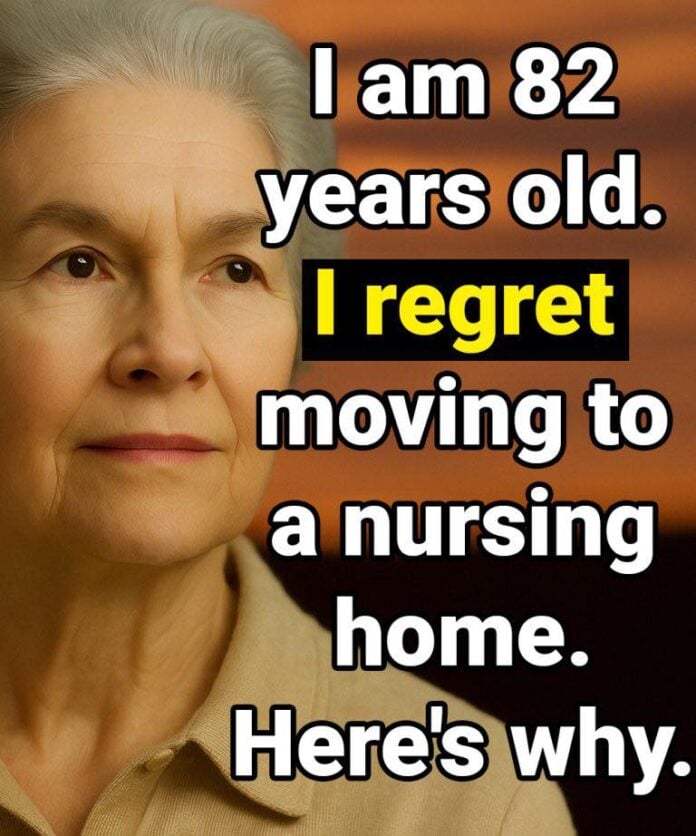At first glance, nursing homes seem to promise everything an aging adult or worried family could want — safety, companionship, medical care, and peace of mind. The brochures show smiling residents, neat gardens, and friendly staff. For many, it feels like a practical and responsible decision.
But behind that polished promise lies a quieter truth — one that many residents only discover after they’ve given up their house keys and stepped through those doors. What begins as relief can slowly become regret, not because of neglect or cruelty, but because of something deeper: the quiet loss of independence, privacy, and purpose that defines who we are.
If you or someone you love is considering moving into a nursing home, take a moment to read these reflections from those who have lived it. These are not complaints — they’re lessons learned the hard way.
1. Independence Slips Away in Small Steps
At first, it feels comforting to have others handle the chores — no cooking, no cleaning, no worries. But that comfort can quietly turn into dependence.
Soon, your days are ruled by other people’s schedules. Meals are served at set times. Medication is given on cue. Lights go out at the same hour each night.
You no longer choose when to take a walk, what to eat, or even when to have a cup of coffee. The small routines that once gave life shape — watering your plants, brewing tea, choosing your clothes — begin to fade.
Independence doesn’t vanish overnight; it slips away softly, until one day you realize you’ve stopped making decisions for yourself. And getting that freedom back is harder than anyone tells you.
2. Loneliness Hurts More Than Most Illnesses
When you first arrive, there’s excitement. Family visits often, staff greet you warmly, and your room still smells faintly of home. But as months pass, the rhythm changes.
Calls become shorter. Visits less frequent. Not because your family doesn’t love you — but because life outside keeps moving, while yours begins to stand still.
The building may be full of residents, yet the halls often echo with silence. Loneliness in a crowd is a heavy kind of quiet — the kind that seeps into your thoughts when the lights go out.
Human beings need connection to feel alive. When that connection fades, even the best care can feel empty.
3. Life Without Purpose Loses Its Spark
At home, you always had something to do — cooking, tending the garden, fixing things, caring for someone, creating something new. Those daily tasks weren’t just chores; they gave your days meaning.
In a nursing home, everything is done for you. Meals arrive on time, beds are made, and laundry is handled. What sounds like ease at first soon becomes emptiness.
Without purpose, the hours stretch long and dull. Some residents lose interest in reading, writing, or even conversation. The body may rest, but the mind begins to fade when it has nothing left to build, plan, or hope for.
It doesn’t take much to rekindle that spark — a book, a plant, a puzzle, a letter to a grandchild. What matters is that you keep doing something that reminds you you’re still needed, still capable, still you.
4. The Body Weakens Faster Than Expected
Ironically, a place designed to care for the elderly can sometimes accelerate physical decline. Without the need to move — to sweep, cook, or climb stairs — the muscles weaken.
Many who walked in with canes find themselves relying on wheelchairs months later. It’s not illness, but inactivity, that quietly steals strength.
Movement is more than exercise — it’s independence. Staying active in any way possible, from chair exercises to hallway strolls, helps preserve not only mobility but confidence.
When the body moves, the spirit follows.
5. Privacy Becomes a Rare Luxury
In most nursing homes, privacy fades into memory. You may share a room with a stranger. Staff come and go freely — to help, yes, but also to monitor, clean, and care.
Even simple moments — dressing, bathing, resting — may require assistance. For some, this feels like kindness. For others, it feels like the quiet erosion of dignity.
No matter how compassionate the caregivers are, losing the ability to close a door and be truly alone can wear at the soul. The comfort of solitude, the freedom to think or pray in peace, becomes something to long for.
6. Leaving Is Harder Than You Think
Many people move in believing, “If I don’t like it, I can always leave.” But few realize how complicated leaving can be.
The old home might be sold. The furniture given away. The finances tied to long-term care contracts. And perhaps most painfully, your confidence begins to wane.
When you’ve spent months or years following routines built by others, the idea of managing life on your own again can feel daunting — even frightening. The very structure designed to make life easier can make freedom feel impossible.
Before You Decide
If you’re considering a nursing home, take your time. Explore every option first.
There are home-care programs, visiting aides, and independent living communities that offer support without taking away freedom. Talk openly with your family. Don’t let guilt, fear, or pressure make the decision for you.
If you do decide to move, ask questions before signing anything:
- What control will I have over my schedule and meals?
- Can I personalize my room?
- How easy is it to leave if it doesn’t feel right?
Once you move in, stay active — physically, mentally, and socially. Join activities, make friends, share stories, and speak up about your needs. Your voice still matters, even inside a system that often assumes it doesn’t.
Moving into a nursing home isn’t always a mistake. For some, it’s a lifeline — a place of safety, warmth, and community. But for others, it can become a slow surrender of everything that made life feel like theirs.
Aging with dignity doesn’t mean giving up control. It means continuing to make choices — big or small — that keep you connected to who you are.
Before you trade your independence for convenience, ask yourself one question:
Do I want to be taken care of — or do I still want to take care of my own life?
Because real comfort doesn’t come from perfect hallways or well-timed routines. It comes from knowing that you are still the author of your own days — free to choose, to feel, and to live as you wish.



